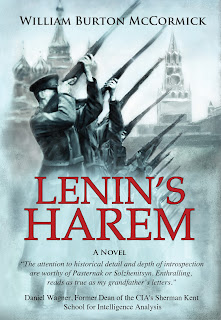By William Burton McCormick

Every author who wants to write a historical
novel set in a foreign locale has a fundamental problem: How does one overcome language
barriers, cultural differences and temporal and physical distances to get the
perspectives of those living in a bygone era?
The problem is further complicated when the historical setting is the
early Soviet Union, where information was lost or locked away and official versions
of events were distorted to glorify the Communist Party.
I encountered this problem when I first began Lenin’s
Harem, my historical novel about the Latvian Riflemen, the doomed
vanguards of the Russian Revolution. The
Riflemen were arguably the first great heroes of the Bolshevik Revolution, but
they would fall out of favor both with Soviet government and to some degree
their own people in later years. Finding unbiased information on the American side of the
Atlantic was nearly impossible. History books, even ones on Latvia, made only fleeting
references to them. Certainly no
source provided enough detail to write narrative fiction.
But I was determined
to get the story no other Western writer had yet touched. So, to pierce the veils of history and totalitarian
regimes, I moved to Latvia, living in Riga sixteen months to
unearth the facts.
It was a daunting experience at first. I arrived in Latvia, knowing
little of the language, knowing nobody, not even where I was going to
live. But, for me, there was no other way to do it. I had to
immerse myself completely in the land, the people and its history. I rented an
apartment in the center of the city and began to explore the country and its
past. I met with historians, museum curators and journeyed to every place
depicted in the novel. The longer I stayed, the more the region’s tragedies became
clearer to me. Nearly every family had
lost someone to the World Wars or Stalin’s purges. I saw the pictures of
smiling children who would die on prison trains and went to the graves of
soldiers murdered by their own generals.
The biggest challenge, by far, was that much
of the information simply wasn’t available in English. To communicate with
older historians and specialists on the Latvian Riflemen, I had
to use translators. But this was frustrating
and expensive. Because of the Soviet occupation
of Latvia through 1991 much of what had been
recorded was in Russian rather than Latvian.
So, as a next step, I set off for Moscow for a fifteen month course in
Russian at Moscow State University. My spoken Russian is still terrible, but I
used the knowledge I gained at the university to help me with written
translation. The time in Moscow also gave me access to the Russian point of
view on these events. It gave the book an additional perspective.
There’s
no reason to transport yourself across the world to sit in a room studying. No matter how
busy I was I always took time to journey to some location or meet with some key
person. Yet, as my research
amassed, I began to spend those long winter nights writing twelve or fourteen
hours at a sitting, often until five or six in the morning. I didn’t want any
distractions. No internet, no television, only a few music CDs for
entertainment.
During this time, I accumulated so much research that I spent the next years cutting
through it and polishing Lenin’s Harem into the best, most accessible
book I could muster. I knew no one would read a dry historical account. It had
to be a gripping, human narrative.
Solid entertainment with a warning underneath about the dubious rewards of
defending totalitarian regimes.
I thought I had succeeded, but I decided to test it. I wrote
a short story about a Latvian revolutionary in a similar style and submitted it
to Alfred Hitchcock’s Mystery Magazine, a publication known firstly as
popular entertainment and secondly as a tough market to crack. When the story, “Blue
Amber”, was accepted, I knew I had the right balance between fiction and
history. In fact, the work was eventually nominated for a Derringer award as
one of the year’s best.
Then, it was on to submitting the novel and Knox Robinson Publishing picked it
up. I was honored to see something to which I had dedicated so many years
finally realized.
Was it worth it? Well, strictly in financial
terms, unlikely. Living years in Eastern Europe is not a way to make money. But measured in life experiences, inspirations for further works of fiction and an accurate, gripping
novel as end product – I think I
have succeeded.
Author Bio:
William
Burton McCormick was born in Maryland and raised in Nevada. He graduated from
Brown University with degrees in Ancient Studies and Computer Science and
earned an MA in Novel Writing from the University of Manchester. He is a
published fiction author and a member of Mystery Writers of America and
International Thriller Writers. William
is Hawthornden Fellow for 2013.
Lenin’s Harem Synopsis:
Lenin’s
Harem is the story of Wiktor
Rooks, a ruined aristocrat swept up in the chaos of World
War I, who by twist of fate finds himself a member of the elite guard of the
Russian Revolution, a group of Latvian soldiers known colloquially as “Lenin’s Harem”
for their loyalty to the Bolshevik
cause. Concealing his aristocratic past from his enemies, Wiktor hides in plain sight while the Russian Empire crumbles around him. But where does he go when
the revolutionaries win?
Connect with William Burton McCormick




No comments:
Post a Comment